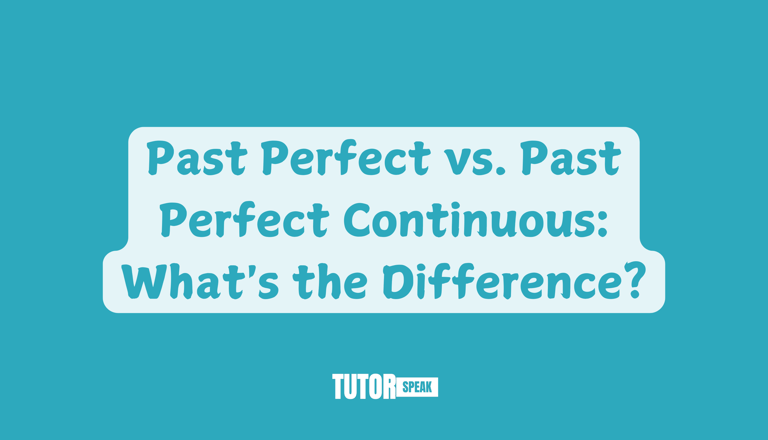Past Perfect vs. Past Perfect Continuous: What's the Difference?
The Past Perfect and Past Perfect Continuous tenses are used to describe actions that happened before another event in the past. However, they are used in different contexts. This article will explain their differences, provide examples, highlight common mistakes, and offer exercises to help you master these tenses.
TutorSpeak
3 min read


Past Perfect vs. Past Perfect Continuous: What's the Difference?
The Past Perfect and Past Perfect Continuous tenses are used to describe actions that happened before another event in the past. However, they are used in different contexts. This article will explain their differences, provide examples, highlight common mistakes, and offer exercises to help you master these tenses.
What Is the Past Perfect Tense?
The Past Perfect is used to describe an action that was completed before another past action or a specific time in the past. It helps to show the order of past events.
Structure:
Subject + had + past participle (V3)
Examples:
She had finished her homework before her parents arrived. (Her homework was completed before her parents came.)
By the time we got to the station, the train had already left. (The train left first, then we arrived.)
He had never seen the ocean before he moved to California. (He moved to California after never seeing the ocean before.)
Common time expressions: before, after, already, by the time, never, until, once.
What Is the Past Perfect Continuous Tense?
The Past Perfect Continuous focuses on the duration of an action before another event in the past. It is used when emphasizing how long something had been happening.
Structure:
Subject + had been + verb-ing
Examples:
She had been studying for hours before the exam started. (Focus on the duration of studying.)
They had been waiting for the bus for 30 minutes before it finally arrived. (Waiting happened over a period of time.)
He was tired because he had been working all day. (His tiredness is the result of continuous work.)
Common time expressions: for, since, before, until, all day, all morning.
Key Differences Between Past Perfect and Past Perfect Continuous:
Completed action vs. duration
Past Perfect focuses on a completed action before another past event.
Past Perfect Continuous focuses on how long the action had been happening before another past event.
Used with stative verbs
Past Perfect is used with stative verbs (e.g., know, like, own, believe).
Past Perfect Continuous is not used with stative verbs.
Temporary vs. permanent situations
Past Perfect Continuous is used for temporary actions.
Past Perfect is used for both temporary and permanent actions.
Common Mistakes:
1. Using Past Perfect Continuous with Stative Verbs
❌ She had been knowing him for years.
✅ She had known him for years.
Explanation: "Know" is a stative verb and does not take the continuous form.
2. Using Past Perfect Instead of Past Perfect Continuous for Ongoing Actions
❌ I had worked at the company for five years before I left.
✅ I had been working at the company for five years before I left.
Explanation: Since we focus on duration, Past Perfect Continuous is used.
3. Using Past Perfect Continuous for a Completed Action
❌ By the time we arrived, she had been cooked dinner.
✅ By the time we arrived, she had cooked dinner.
Explanation: "Cooked dinner" is a completed action, so Past Perfect is used.
4. Using Past Perfect When It’s Not Necessary
❌ After he had finished his work, he went home.
✅ After he finished his work, he went home.
Explanation: If the sequence of events is clear, the Past Perfect is not necessary.
Exercises:
Exercise 1: Fill in the blanks with the correct form of the verb.
She _________ (study) for three hours before she took a break.
We _________ (finish) our meal before the waiter brought the bill.
They _________ (wait) for the bus for 20 minutes before it finally arrived.
He _________ (read) that book before, so he knew the story.
The children _________ (play) in the garden all afternoon before their mother called them inside.
Exercise 2: Correct the mistakes in the following sentences.
I had been knew about the meeting before she told me.
He had finished his work before we had arrived.
She had been writing three reports before lunchtime.
By the time I arrived, they had been eaten dinner.
We had been waited for an hour before the train arrived.
Exercise 3: Choose the correct option.
He __________ (had worked / had been working) at the company for 10 years before he retired.
She __________ (had been practicing / had practiced) the piano for hours before the concert.
We __________ (had been waiting / had waited) for the bus for 30 minutes when it finally arrived.
He __________ (had left / had been leaving) before I got there.
The children __________ (had been playing / had played) all afternoon and were very tired.
Exercise 4: Write sentences using the following prompts.
I / live / in that city / for five years / before I moved.
She / work / on the project / before it was canceled.
They / wait / for hours / before the doors opened.
We / not / see / that movie / before last night.
He / run / for an hour / before he took a break.



